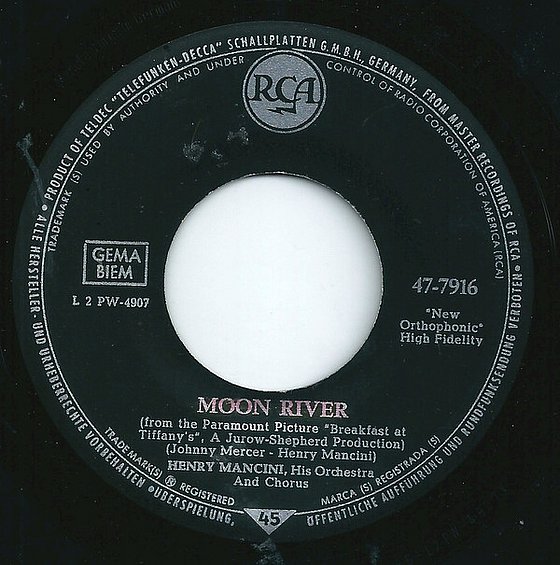
The composer Henry Mancini
Christoph Spengler / Director of the choir and orchestra of the University of Wuppertal
Photo: Sergej Lepke
The man with a keen sense of melody, form, harmony, sound and rhythm
Christoph Spengler, choir and orchestra director at Bergische Universität, on the 100th birthday of the composer Henry Mancini
His best-known compositions include the music for the film "The Pink Panther" and the song "Moon River" from the film "Breakfast at Tiffany's". We are talking about Henry Mancini, whose 100th birthday is on 9 April. Who was this musician?
Spengler: Henry Mancini - his real name was Enrico Nicola Mancini - was, as the name might suggest, the son of Italian immigrants. In the years before the First World War, his parents moved from Abruzzo to America. It was there that they met and married. His father Quinto was a steelworker, but loved music. He therefore encouraged his only son Henry to learn to play the piccolo and flute and to improve his skills with him in the folk band "The Sons of Italy". As a teenager, Henry also learnt to play the piano and initially attended the Carnegie Institute of Technology after graduating from high school, but transferred to the Juilliard School of Music in the same year. In the entrance exam, he played a Beethoven sonata and an improvisation on "Night and Day" by Cole Porter. His stylistically wide-ranging interests were already evident here and would characterise the rest of his artistic life. He had to interrupt his studies when he was called up for military service. In 1945, he was involved in the liberation of the Mauthausen concentration camp. After the war, he expanded his knowledge of composition and arranging and studied compositions by Ernst Krenek and Mario Castelnuovo-Tedesco.
His particular passion throughout his life was the big band, and he was also a member of the newly formed Glenn Miller Band. How did he get involved?
Spengler: At the age of 12, the young Mancini was already very interested in arranging music for big band and orchestra. His teacher, Max Adkins, introduced him to the then up-and-coming Benny Goodman, and he even wrote an arrangement for his band. I find it fascinating that he cites the composers Chopin and Schumann as particular inspirations for his arrangements, in order to see "how the puzzle of form, metre, melody, harmony and counterpoint was solved by these earlier composers". During his military service, he met musicians from the Glenn Miller Band and also played in the Air Force Band. Through these contacts, Mancini became the pianist and arranger of the Glenn Miller Band after the war, although at the time it was no longer led by Miller himself, but by Tex Beneke, as Glenn Miller had gone missing during the war and was declared dead.
From the 1950s onwards, Mancini composed more and more film music and introduced new musical styles to the cinema. What were they?
Spengler: Mancini intensified his studies in composition and arrangement after the war. In doing so, he worked very intensively with the works of classical composers. I think that also opened the door for him to be of interest to filmmakers, because film music at the time was dominated by late romantic orchestral music. He was able to work in this genre, and so he wrote his first film scores - mostly without being named in the film credits - for films such as "The Terror of the Amazon" or "Tarantula". In 1954, he received his first Oscar nomination for his arrangements for "The Glenn Miller Story". His increasing popularity enabled him to introduce new styles of music for film. He was one of the first to make jazz acceptable as film music. Mancini was particularly proud of his music for the Orson Welles film "Under the Sign of Evil", the first major film score with Latin jazz at the time.

Single from Moon River
Photo:public domain
Over time, he was entrusted with bigger and bigger film music projects and the "Baby Elephant Walk" from the film Hatari in particular remains a catchy tune to this day once you have heard it. He also received a Grammy for it in the best instrumental arrangement category. What is special about his style?
Spengler: I think this music is so successful not least because of its unusual instrumentation and tongue-in-cheek humour. Not everyone would think of a clarinet played in a high register accompanied in the intro by a steam organ, as used in the circus back then. It is this unusual sound that sets the composition apart from other big band pieces of the time. Mancini was an arranger through and through, looking for new and unusual sounds. Incidentally, the theme music to the crime series "Peter Gunn", which he also composed, is similarly iconic. And who could get the theme from "The Pink Panther" out of their head once they've heard it? I can hear Mancini's cross-genre interest and his masterful art of orchestration in all these titles. What is often astonishing is the simplicity and the deliberately reduced instrumentation of the pieces, which emphasises individual instruments with special playing styles. This and the melodic ingenuity make these works so special.
He later also conducted international orchestras, always playing instruments himself. Which ones were they?
Spengler: Mancini was regarded as an excellent conductor. As he was an outstanding arranger, he had a comprehensive understanding of the individual instruments and was therefore able to balance his orchestras very effectively and bring even the finest details to life in his compositions. He also had a great talent for creating a co-operative and approachable working atmosphere on the one hand, while at the same time exuding a natural authority on the podium. As he was also an excellent pianist and flautist, he sometimes played these instruments himself during his conducting, which enabled him to directly influence the sound and interpretation of his music. This helped to make his performances a captivating and unforgettable experience for his audiences.
He was also successful again in the German charts in the 1980s with his film music for the series "Die Dornenvögel", a story about a priest in love. He is one of the most popular representatives of easy-listening music. Does that do him justice?
Spengler: No! In the music world, the term "easy listening" often has a pejorative connotation, along the lines of "what many people like can't be art" - what elitist nonsense! Mancini's music is characterised by such a high level of tonal inventiveness and incredible finesse in the use of each individual instrument that I can only speak of true mastery. He had a keen sense of melody, form, harmony, sound and rhythm. The fact that his music is so easy on the ear shows me at best how well made it is. Alongside colleagues such as Leroy Anderson, I consider Mancini to be one of the great American composers and arrangers, and I am sure that his melodies will still be inspiring people in one or two hundred years' time.
Uwe Blass
Christoph Spengler studied church music in Düsseldorf. He took over the direction of the university choir in 2007 and the orchestra in 2011. In 2016, the rectorate awarded him the University of Wuppertal's Medal of Honour. In 2017, he was appointed church music director by the Protestant Church in the Rhineland.
